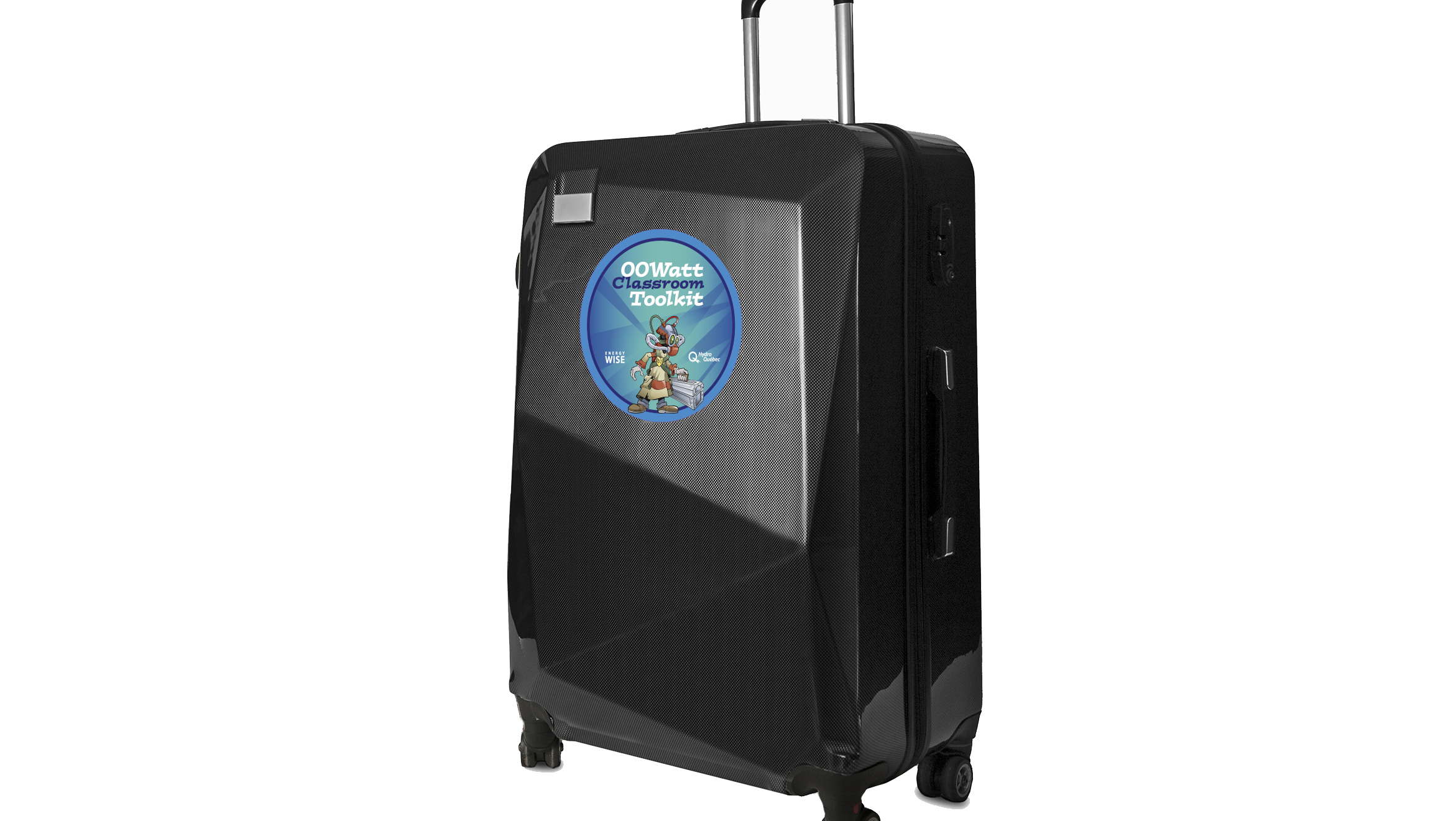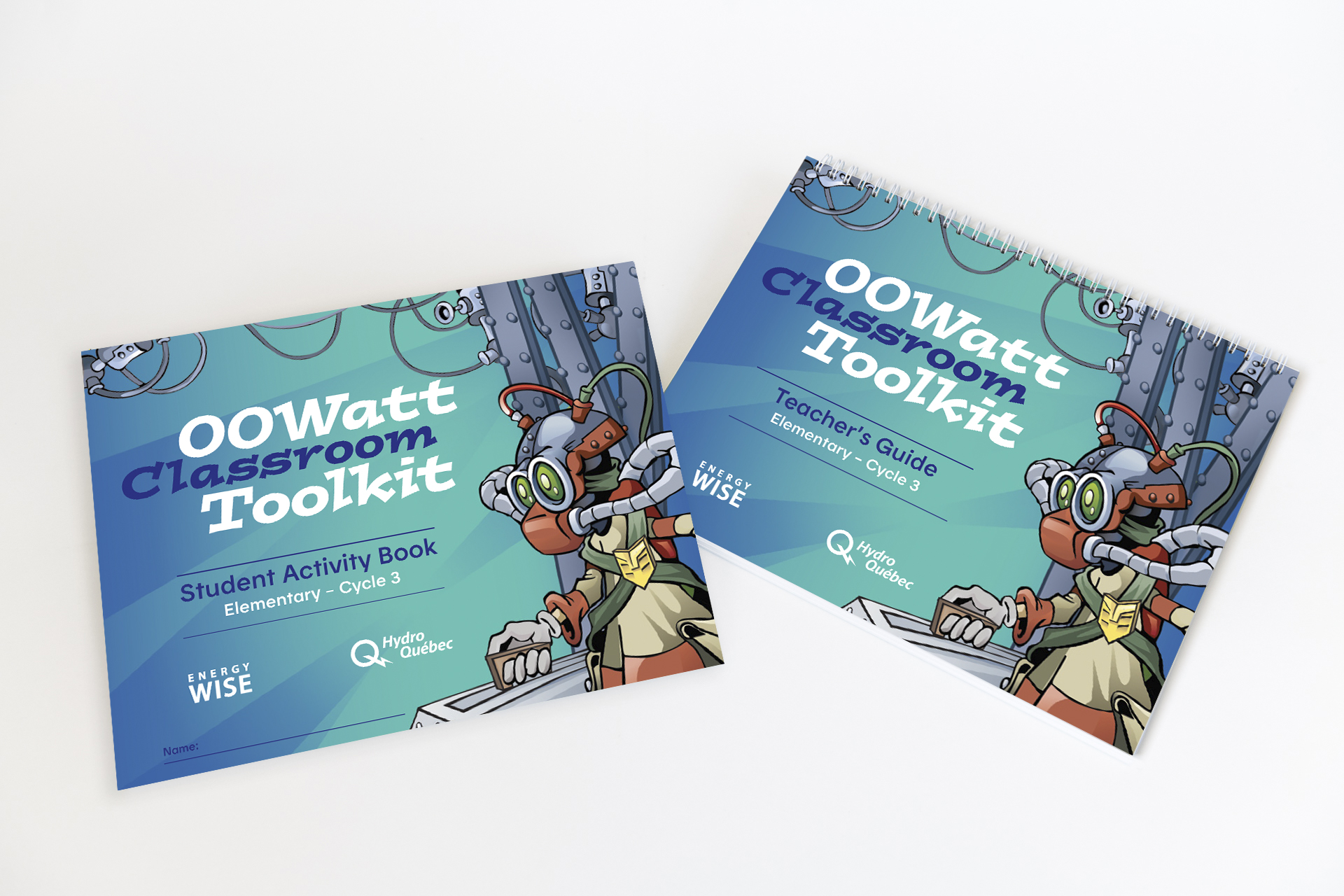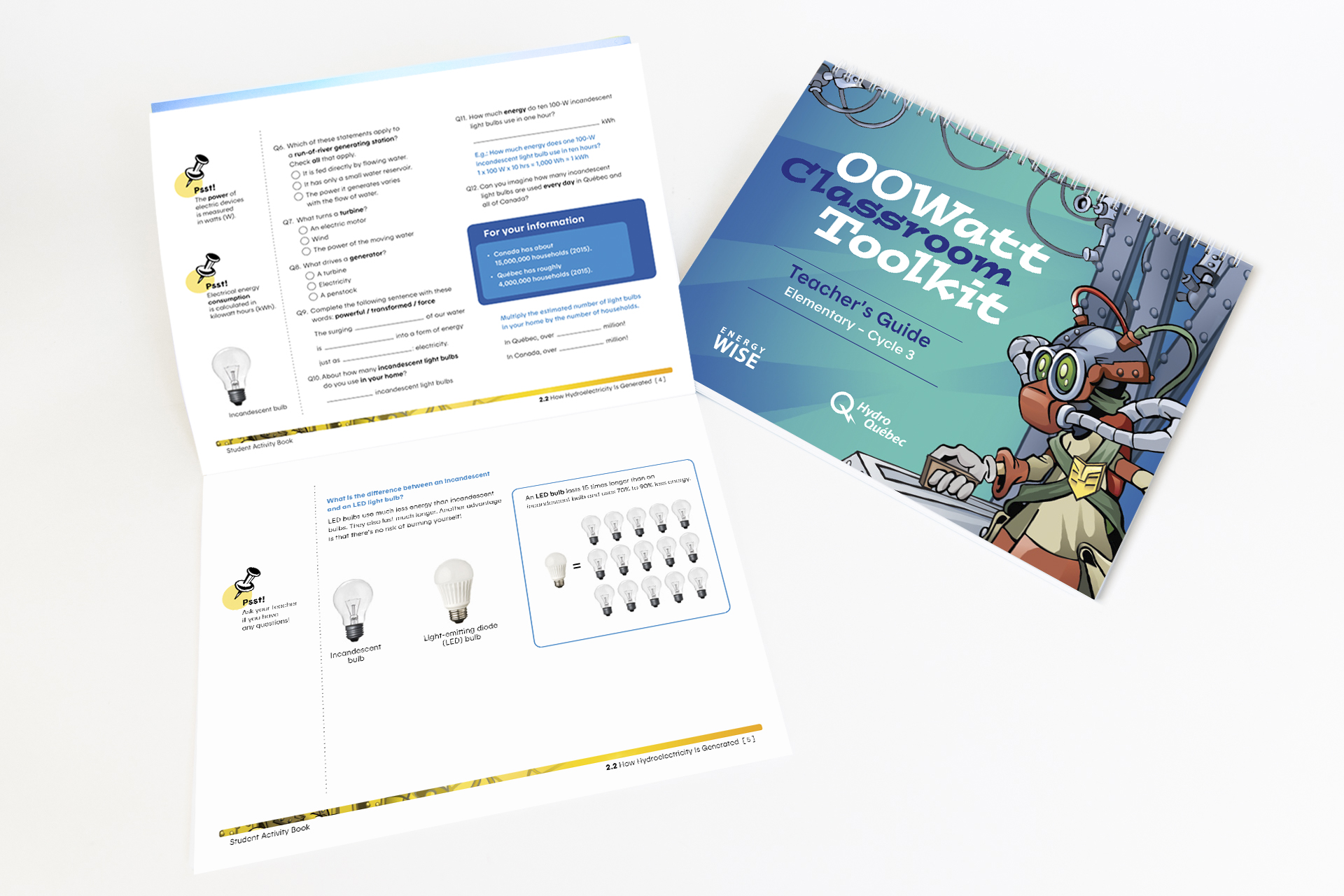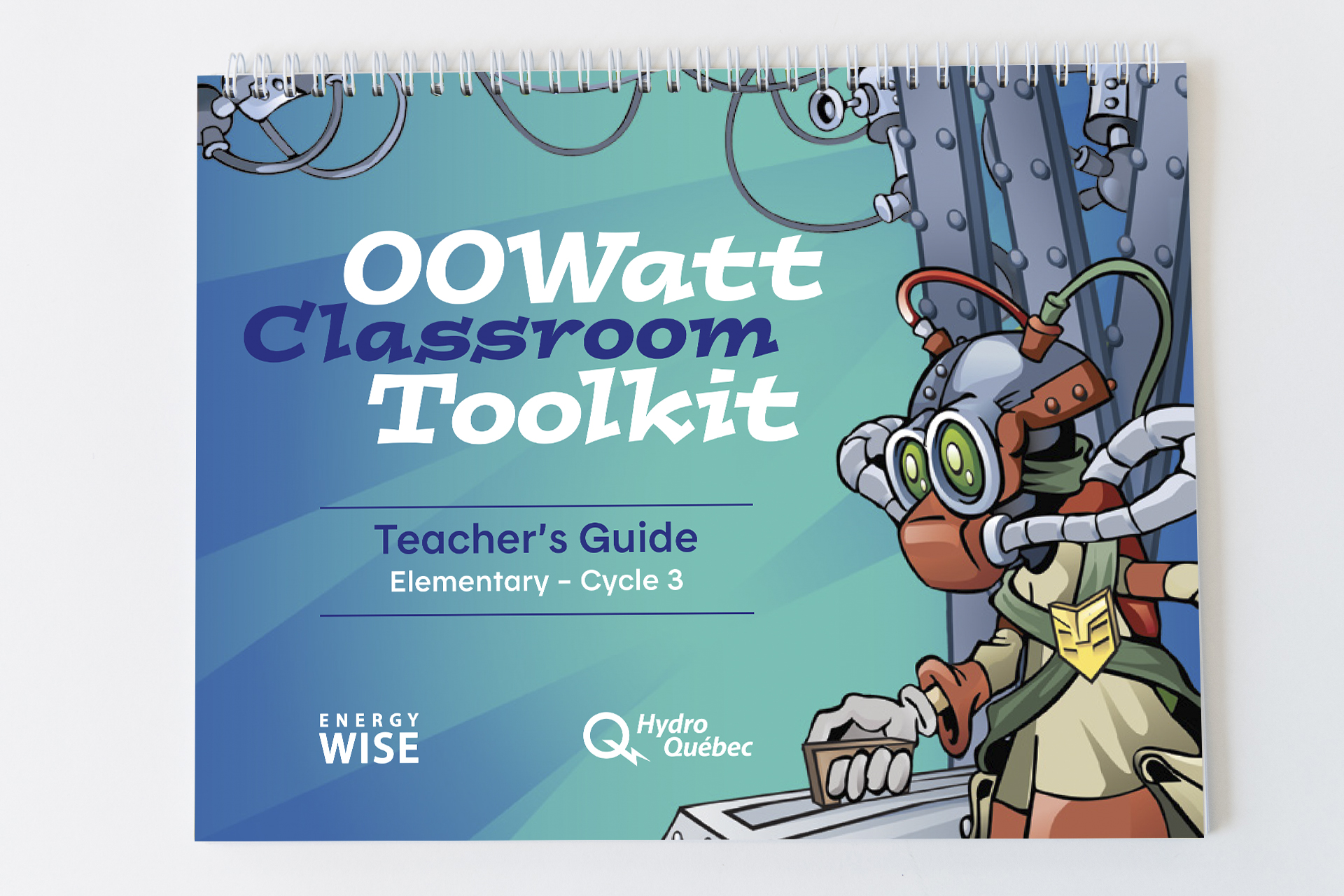00Watt Toolkit
Join the investigation!
With Inspector 00Watt and his toolkit full of scientific investigations, games and experiments, show your students how they can become energy efficiency ambassadors.
Spread over five weeks, this project helps students learn how hydroelectricity is generated, grasp the amount of energy we consume and discover how to avoid wasting resources.
Aimed at grades 5 and 6, the 00Watt Toolkit is takes a playful, interactive approach to learning and meets the requirements of the Québec Education Program.
Get the kitUseful information
Objectives
- Raise awareness of saving energy and the importance of responsible power consumption.
- Learn about the technology used in producing, transmitting and distributing electricity.
- Understand how energy can be wasted in the home and develop everyday habits for saving energy.
Target audience
Elementary Cycle 3 (ages 10 to 12)
Cost
Free!
Kit contents
- Carrying case
- Teacher’s Guide
- Student workbooks (one for the teacher and one per student)
- USB key
- DVD
- Materials provided
- Pitcher, turbine and timer
- Light bulbs, electric wires and batteries
- Costumes
- Energy- and water-saving products
- And more!
Duration
Some 15 hours in total, or approximately three hours per week for five weeks (classroom and at-home activities). For more information, see the suggested timetable [PDF 28 kB]
Links
| Subject-specific competency | Progression of learning |
|---|---|
|
English Read a variety of texts |
|
|
Science and Technology Material World (Energy and Systems and interaction) |
|
|
Science and Technology Living Things (Systems and interaction) |
|
|
Mathematics Arithmetic and Measurement |
|
|
Geography, History and Citizenship Education |
Knowledge related to the organization of a society in its territory
Researching and working with information in geography and history
|
| Broad area of learning | Focus of development |
|---|---|
|
Environmental awareness/consumer rights and responsibilities Encourage students to create an active relationship with their surroundings while maintaining a critical stance regarding natural resource use, technological development and consumer goods. |
|
Here are a few more interesting resources related to the kit!
Like to know more about the topic? Our website is packed with relevant, accessible information about energy. Here are just a couple of suggestions!
Want to be ready for when your kit arrives? Discover the toolkit’s downloadable materials and digital games.
General
- Teacher’s Guide [PDF 8.1 MB]
- Appendix to the Teacher’s Guide (off-grid systems only) [PDF 1.7 MB]
- Student Activity Book [PDF 10.52 MB]
- Letter to parents [PDF 61 kB]
- Suggested timetable [PDF 28 kB]
Part 1 – Introduction to Energy Conservation: OOWatt’s Mission
- Student instruction sheet for Role-playing exercise 1.1: The meeting [PDF 358 kB]
- Wanted poster describing Terawattus Energivorus [PDF 242 kB]
- Video slideshow: Electricity over
time

Part 2 – Hydroelectricity: An Adventure Right down the Line!
- Student instruction sheet for Role-playing exercise 2.1: Turn Me On! [PDF 156 kB]
- Video: Energy is neither created
nor destroyed

- How a hydroelectric generating station works
- Digital game: An Adventure Right down the Line!
- Overview of Generating Facilities map [PDF 789 kB]
- Quiz A [PDF 399 kB]
- Answer Sheet A [PDF 407 kB]
- Quiz B [PDF 400 kB]
- Answer Sheet B [PDF 405 kB]
Part 3 – Electric Appliances and Devices: Electricity at Home
- Comic strips: Waste Not, Want Not! [PDF 16 MB]
Part 4 – Energy Consumption Habits: Tracking down the Virus
- Student instruction sheet for Role-playing exercise 4.1: [PDF 142 kB]
- Video: Doing something for the
planet doesn’t require too much energy!

Part 5 – Ways to Save Energy: Stop the Virus!
- Comic strips: Stop the Virus! [PDF 16 MB]
- Digital game: The ENERGY-WISE Squad
- Digital game: Mystery Objects
- Digital game: Unplugged!
Student assessment tools
End of part 2
- Student evaluation 1: Energy Sources [PDF 164 kB]
- Evaluation 1 answer sheet: Energy Sources [PDF 215 kB]
End of part 3
- Student evaluation 2: Calculating Energy Cost [PDF 540 kB]
- Evaluation 2 answer sheet: Calculating Energy Cost [PDF 189 kB]
End of part 4
End of part 5
- Evaluation 4: Poster Evaluation Table - Science and technology [PDF 186 kB]
- Evaluation 5: Poster Evaluation Table - English Language Arts [PDF 163 kB]
- Evaluation 6: Poster Evaluation Table - Visual Arts [PDF 161 kB]
- Evaluation 7: Oral Presentation Evaluation Table - English Language Arts [PDF 172 kB]
The 00Watt Toolkit can be lent out to Elementary Cycle 3 teachers at
Québec schools for a five-week period. Reservations are managed for
Hydro‑Québec by Réseau
Technoscience ![]() , which has branches across Québec. A limited
number of kits are available from each branch. To reserve a kit, please
contact the branch nearest you.
, which has branches across Québec. A limited
number of kits are available from each branch. To reserve a kit, please
contact the branch nearest you.
Head office
Réseau Technoscience
Phone: 514 252-3027
Email:
info@technoscience.ca
Website: technoscience.ca ![]()
Regional branches
Technoscience Est-du-Québec
Phone: 418 723-5448
Email:
coordination@technoscience-eq.ca
Technoscience Mauricie, Centre-du-Québec
Phone: 819 376-5077
Sans frais : 1 877 371-0970
Email:
clesenmain@technoscience-mcq.ca
Technoscience Outaouais
Phone: 819 770-5252
Email:
secretariat@technoscienceoutaouais.ca
Technoscience Saguenay–Lac-Saint-Jean
Phone: 418 668-4792, extension 603
Email:
info@technoscience-saglac.ca
Technoscience Estrie
Phone: 819 565-5062
Email:
chapdelainee@technoscienceestrie.ca
Technoscience Abitibi-Témiscamingue
Phone: 819 797-1631, extension 101
Sans frais : 1 866 331-1631
Email:
info@technoscienceat.ca
Boîte à science – Québec et
Chaudière-Appalaches
Phone: 581 999-7209
Email:
alienorguichard@boiteascience.com
Technoscience Région métropolitaine
Phone: 438 940-4963
Email:
saoubid@technoscience-rm.ca
Technoscience Côte-Nord
Phone: 418 962-0959
Sans frais : 1 877 962-0959
Email:
coordo@technosciencecn.com

Sign up for our Teachers Newsletter
Be the first to find out about new resources: free educational materials, contests, games and tours tailored to teaching programs.







